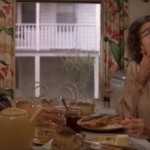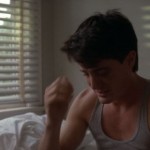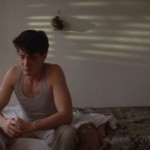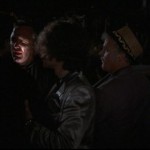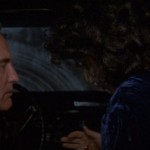The Blue Velvet Project
-
The Blue Velvet Project, #115

Second #5405, 90:05 Detective Gordon (aka The Yellow Man, or The Man in Yellow, played by Fred Pickler) sits at his desk at police headquarters, where Jeffrey has gone to see Detective Williams. He spots Gordon in his office and, startled that this is the same man he’d seen earlier with Frank, takes a moment at a drinking fountain across from Gordon’s office to get a better look, which constitutes this shot. Gordon is a terrifying presence for reasons that are impossible to sort out. The fact is he shouldn’t be terrifying, sitting there in his yellow (yellow!) jacket, working […]
by Nicholas Rombes on May 18, 2012 -
The Blue Velvet Project, #114

Second #5358, 89:18 When Blue Velvet is funny, it is very funny. This shot opens with Jeffrey’s mother and his Aunt Barbara (the late, great, Frances Bay) looking up from the breakfast table at something, aghast. However, in a sharp instance of delayed decoding, we don’t see what they see for several seconds. For all we know, they could be looking in frozen horror at an intruder, or a monster (perhaps the entity behind the Winkie’s dumpster from Mulholland Drive), or something visible only to them. It is only at this moment that we see what they see: Jeffrey, whose […]
by Nicholas Rombes on May 16, 2012 -
The Blue Velvet Project, #113

Second #5311, 88:31 1. This frame is from around twelve seconds into a thirteen-second shot, just before the screen goes black. Jeffrey sobs. The unflinching, unmoving camera eye does not look away. There is no soundtrack. There is nothing ironic or postmodern about this moment. 2. Paul Virilio, from his book Open Sky: ‘If anyone thinks I paint too fast, they are watching me too fast,’ Van Gogh wrote. Already, the classic photograph is no more than a freeze frame. With the decline in volumes and in the expanse of landscapes, reality becomes sequential and cinematic unfolding finally gets the […]
by Nicholas Rombes on May 14, 2012 -
The Blue Velvet Project, #112

Second #5264, 87:44 This shot comes at the beginning of a montage that unfolds in this sequence: 1. Jeffrey on bed, from which the frame at second #5264 is taken: 11 seconds 2. flashback to Dorothy’s face, close-up, “hit me”: 2 seconds 3. back to Jeffrey on bed: 8 seconds 4. flashback to Jeffrey hitting Dorothy: 2 seconds 5. back to Jeffrey on bed, crying, camera dollying in: 8 seconds 6. implied flashback; close-up of Donny’s helicopter hat: 2 seconds 7. back to Jeffrey on bed, crying: 4 seconds 8. flashback to bedroom door in Ben’s apartment where Donny is […]
by Nicholas Rombes on May 9, 2012 -
The Blue Velvet Project, #111

Second 5217, 86:57 I wondered when, or if, this would happen: a Blue Velvet frame that depicts nothing. This comes from the time-space between the beating that leaves Jeffrey unconscious and waking up the next morning in the dirt. For around six seconds between these scenes, the screen is filled with a close-up of a candle flame holding its own against a roar of wind, only to be extinguished, followed by a black screen, from which this frame is taken. Jeffrey’s mind going black. Blank. The black screen, haunted with psychopaths and monsters. Of all of Blue Velvet’s uncharted associations, […]
by Nicholas Rombes on May 7, 2012 -
The Blue Velvet Project, #110

Second #5170, 86:12 In the spirit of the humor of the scene from which this frame is taken (and because it’s Friday) this is a post of a different stripe. Part of what constitutes Blue Velvet’s weird chemistry is its humor, the humor that lies at the end of despair and that arises out of a confrontation with the absurdity of evil. Frank is terrifying in this scene—having just wiped some lipstick from Jeffrey’s face with that talismanic swatch of blue velvet—but also oddly funny. He is a monster, but also pathetic, and the aura of theatrical performance he has […]
by Nicholas Rombes on May 4, 2012 -
THE ‘BLUE VELVET’ PROJECT, #109
Second #5123, 85:23 Knife blade at his throat, Jeffrey is silent. Has he already decided that he’ll kill Frank? Something in his face has changed. He has the weary look of someone who knows how the game will end. In one of the first great books of modern film theory, The Aesthetics and Psychology of the Cinema (1963-65), Jean Mitry traced the gradual emergence of cinema’s ability to use shots and camera movement not merely to convey narrative information but also to convey a point of view that implies some level of judgment about characters in question: Liberated from the […]
by Nicholas Rombes on May 2, 2012 -
The Blue Velvet Project, #108

Second #5076, #84:36 The car has stopped. Jeffrey and Frank and his gang are outside. Dorothy is going nuts inside the car, pleading for Frank not to hurt Jeffrey. Franks orders “In Dreams” to be played. One of the women from Ben’s apartment who’s come along for the ride, climbs on top of Frank’s black Charger and dances on the roof. In a few seconds, Frank will say to Jeffrey: Don’t be a good neighbor to her [Dorothy]. I’ll send you a love letter straight from my heart fucker! You know what a love letter is? It’s a bullet from […]
by Nicholas Rombes on Apr 30, 2012 -
The Blue Velvet Project, #107

Second #5029, 83:49 “Now it’s dark,” Frank has said previously, like some incantation, and now it really is dark. Jeffrey, his back to the camera, is practically swallowed up alive by the blackness, as Frank inhales whatever it is that unleashes his id. There is a flashlight, the dome light of the Charger, and the very small light in the distance that give shape and depth of space to the frame. For the psychoanalyst and philosopher Jacques Lacan the coherent, unified self is an illusion, a fragile thing constructed gradually during an infant’s Mirror Stage, a stage when the ego […]
by Nicholas Rombes on Apr 27, 2012 -
The Blue Velvet Project, #106

Second #4982, 83:02 This frame comes from perhaps the most difficult scene to watch—without flinching or looking away—in Blue Velvet. Frank, getting warmed up for his violent gender-bending abuse of Jeffrey, assaults what is beneath Dorothy’s robe. The viewer is trapped in the backseat with Jeffrey, sutured into his point of view. Jeffrey, who is unable to decipher the meaning of Frank. On one level, Blue Velvet is a post-apocalyptic film, where what has been destroyed is not just buildings but meaning itself. In Brian Evenson’s new novel Immobility, the main character—a paralyzed-from-the-waste-down man named Horkai—considers the devastated landscape as […]
by Nicholas Rombes on Apr 25, 2012
